Chorba
Chorba or shorba is one of various kinds of soup or stew found in national cuisines across the Balkans, North Africa, Central Europe, Eastern Europe, Central Asia, Middle East and the Indian subcontinent.
| Type | Soup or stew |
|---|---|
Types
- Shorwa is a traditional Afghan dish which is a simple dish which is usually mixed with bread on the dastarkhān.[1] It is a long process and a pressure cooker is usually used as it reduces the waiting to 2 hours. The main ingredients for Shorwa are potatoes, beans and meat.[2]
- Ciorbă is a name used to refer to Chorba used in Moldavia and Romania consisting of various vegetables and meat and lovage is usually used. borș is a sour soup that is used in the Moldavia region.[3] It is also has beneficial health effects.[4] It is served hot to stimulate digestion and be effective against colds.[5] There are several types of this dish such as: ciorbă de perișoare, leek soup, Romanian borscht, borș de burechiușe.
Spelling variants
Chorba, shorba is variously derived from the Arabic word[6] meaning gravy[7] or from a Persian term شوربا from shor ("salty, brackish") and ba/ab, آب، ما ("water/stew")[8] or from a hypothetical cognate word common to Arabic and Persian.[9] Shorwa means "soup" in Persian/Pashto.
Chorba is also called shorba (Persian: شوربا, Arabic: شوربة, Amharic: ሾርባ), sho'rva (Uzbek: шўрва), shorwa (Pashto: شوروا), chorba (Bulgarian: чорба), ciorbă (Romanian), shurpa (Russian: шурпа), shorpa (Uyghur: شورپا, USY: шорпа ), çorba (Turkish, Turkmen pronounced [tʃoɾˈba]), shorpo (Kyrgyz: шорпо) and sorpa (Kazakh: сорпа). In the Indian subcontinent, the term shorba in Hindi (Hindi: शोरबा) simply means gravy. It is a Mughlai dish and it has vegetarian forms such as tomato shorba.
Varieties
- Bosnian čorba and somun bread
- Bulgarian чорба
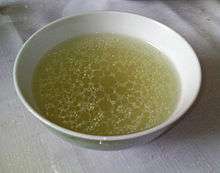 Kyrgyz shorpo
Kyrgyz shorpo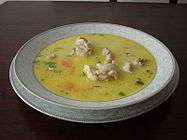 Serbian čorba
Serbian čorba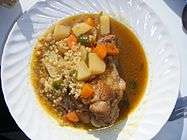 Algerian chorba
Algerian chorba- Traditional Afghan Shorwa.
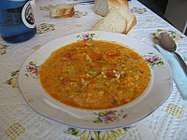 Ciorba
Ciorba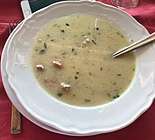 Montenegrin čorba
Montenegrin čorba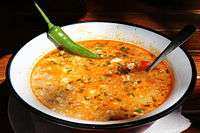 Beef Ciorba
Beef Ciorba
See also
References
| Wikimedia Commons has media related to Chorba. |
- Bradnock, Robert W. (1994). South Asian Handbook. Trade & Travel Publications.
- "Shorwa-E-Tarkari (Meat & Veg Soup)". KitchenRecipes.
- "Teorii de istorie culinară care ne dezamăgesc: borşul şi mujdeiul, singurele alimente cu adevărat româneşti. Micii inventaţi de Cocoşatu' – un mit urban". adevarul.ro. July 30, 2015. Retrieved 2020-03-17.
- "Supa şi ciorba: scurtă istorie". www.historia.ro (in Romanian). Retrieved 2020-03-17.
- "Ce ciorbă preferă să mănânce românii". A1.RO (in Romanian). Retrieved 2020-03-17.
- Marks, Gil (2010-11-17). Encyclopedia of Jewish Food. HMH. ISBN 9780544186316.
- Paniz, Neela (2015-11-05). Indian Slow Cooker. Ebury Publishing. ISBN 9781473528673.
- Alan Davidson (21 September 2006). The Oxford Companion to Food. OUP Oxford. pp. 2055–. ISBN 978-0-19-101825-1.
- Khan, Abdul Jamil (2006). Urdu/Hindi: An Artificial Divide: African Heritage, Mesopotamian Roots, Indian Culture & Britiah Colonialism. Algora Publishing. ISBN 9780875864396.
.jpg)